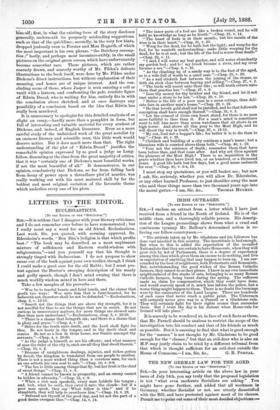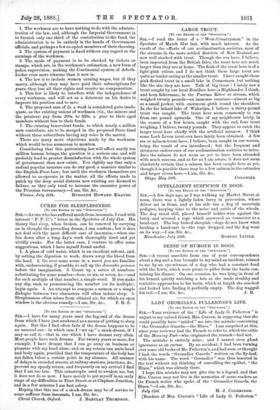THE NEW GERMAN LAW FOR 1.11.0 AGED.
[To THE EDITOR OF THE " SPECTATOR."]
Sia,—In your interesting article on the above law in your issue of July 14th, you say truly that the proposed legislation is not "what even moderate Socialists are asking." Yon might have gone further, and added that all workmen in Germany, whether Socialist or not, are utterly dissatisfied with the Bill, and have protested against most of its clauses. Permit me to point out some of their most decided objections
1. The workmen are to have nothing to do with the adminis- tration of the law, and, although the Imperial Government is to furnish only one-third of the contribution to the fund, the administration is to be entirely in the hands of Government Ctfficials, and perhaps a few co-opted members of their choosing.
2. The system of payment is fixed without any regard to the earnings of the workmen.
3. The mode of payment is to be checked by tickets or stamps, which are, in the workmen's estimation, a new form of police supervision, making the Continental system of Arbeits- irdcher even more irksome than it now is.
4. The law is to include women earning wages, but if they marry, although they may have paid their subscriptions for years, they lose all their rights and receive no compensation.
5. This law is likely to interfere with the independence of every workman, and will act as a deterrent on his desire to improve his position and to save.
6. The proposed sum of 2s. a week is considered quite inade- quate, as the existing unions of workmen (viz., the miners and the printers) pay from 200s. to 320s. a year to their aged members without loss to their funds.
7. The existing benevolent funds, to which nearly a million men contribute, are to be merged in the proposed State fund without these subscribers having any voice in the matter.
There are many more objections made by the workmen, which would be too numerous to mention.
Considering that this patronising law will affect nearly ten million human beings, the question is a serious one, and will probably lead to greater dissatisfaction with the whole system of government than now exists. You rightly say that only a radical popular measure can do any good, a measure similar to
the English 2oor-Law; but until the workmen themselves are allowed to co-operate in the matter, all the efforts made to patch up the deep social distress now existing are doomed to failure, as they only tend to increase the excessive power of the Prussian bureaucracy.—I am, Sir, &o.,
Vienna, July 18th. RUDOLPH HOWARD KRAUSE.



































 Previous page
Previous page